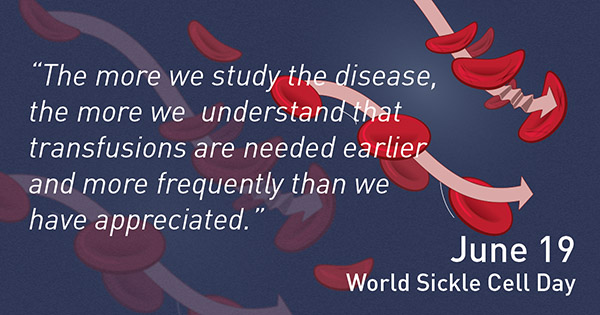
Sickle cell disease (SCD) is a chronic genetic blood disorder inherited from both parents. Having sickle cell trait (inheriting the gene from one parent but not the other) is an advantage against malaria, which is why SCD primarily impacts people of African, Mediterranean, Middle Eastern, and Indian descent.
But the disease itself (which happens when someone inherits genes from both parents) is devastating.
When someone has SCD, their red blood cells are shaped like stiff crescents instead of flexible discs. These pointed cells can snag on blood vessel walls, causing blockages that prevent oxygen from reaching tissues, incredible pain (called a crisis), and damage to a patient’s brain, eyes, internal organs, joints, bones, and skin. These complications can be life-threatening.
Approximately 1 in 500 African Americans (100,000 people in the U.S) have SCD, though as many as 1 in 13 African Americans are carriers of sickle cell trait.
Treatment of SCD often includes chronic blood transfusion therapy to increase the number of healthy red blood cells in the bloodstream, even when a patient is not actively sick. Transfusions can reduce the chance of stroke.
Says Bloodworks Research Institute’s Dr. James Zimring,
Anyone who receives regular blood transfusions is at risk of developing antibodies against antigens in other people’s blood, called alloimmunization. The more antibodies someone makes, the harder it becomes to find blood they can still receive.
Transfusion for transfusion, patients with SCD are more likely to develop antibodies than someone without it. Although science is working hard on it, no one understands all of the reasons why.
Most of us know that our blood type is either A, B, O or AB, and Rh positive or negative, which correspond to antigens on the red cells, but there are actually hundreds of other antigens in the blood.
Dr. Meghan Delaney, BloodworksNW’s Medical Director for Transfusion Service at Seattle Children’s, says:
Other than matching blood to patients, there is no way to prevent a reaction besides not transfusing. For some patients, this can to lead delays, substandard care, and even death.
BloodworksNW’s Immunohematology & Red Blood Cell Genomics Reference Laboratory performs the extended blood typing and matching for patients in the community. Sickle cell patients also have blood typing done by genotype, or molecular methods, since there tends to be blood group differences in people of different ethnic backgrounds that can make figuring different blood types more complicated.
Dr. Zimring explains:
Dr. Zimring hopes to uncover why SCD patients are so difficult to transfuse. He and BloodworksNW’s Dr. Krystalyn Hudson are studying the process by which the immune system makes antibodies to transfused red blood cells.
This awareness will help researchers formulate new therapeutic approaches, which will help both sickle cell patients and others receiving regular transfusions.
One thing is for certain:
More donors of all ethnic backgrounds are needed to help patients in our community. Schedule your next donation
Comments
Share your thoughts →Kim Boggs
If you have repeated blood transfusions, you’ll have routine testing for iron buildup in your body.
Though blood transfusions are an effective treatment for sickle cell disease complications, they are only used selectively. The risks of hemochromatosis and alloimmunization from repeat transfusions makes this procedure more suitable for severe and high-risk conditions.
Tell Us What You Think!